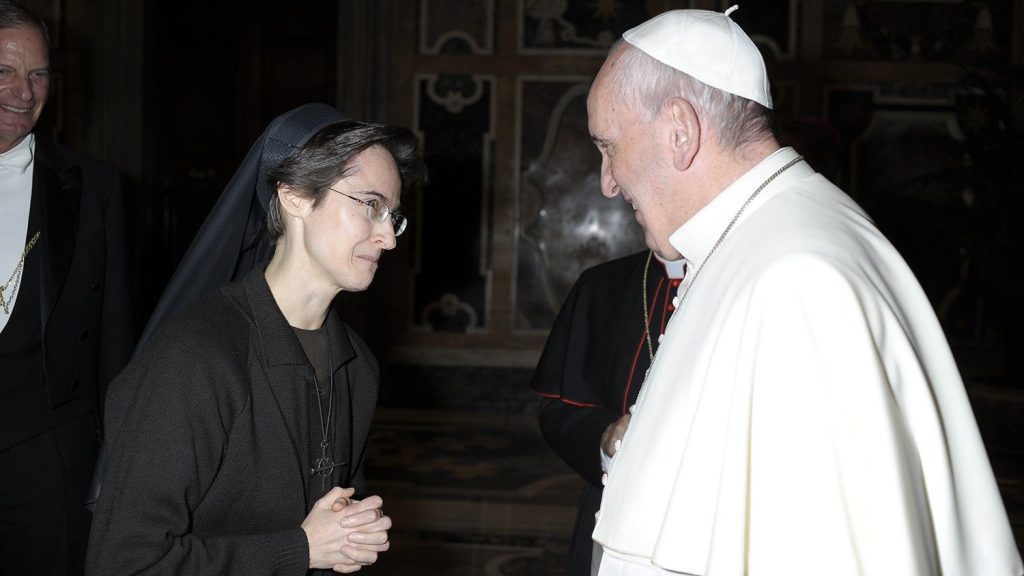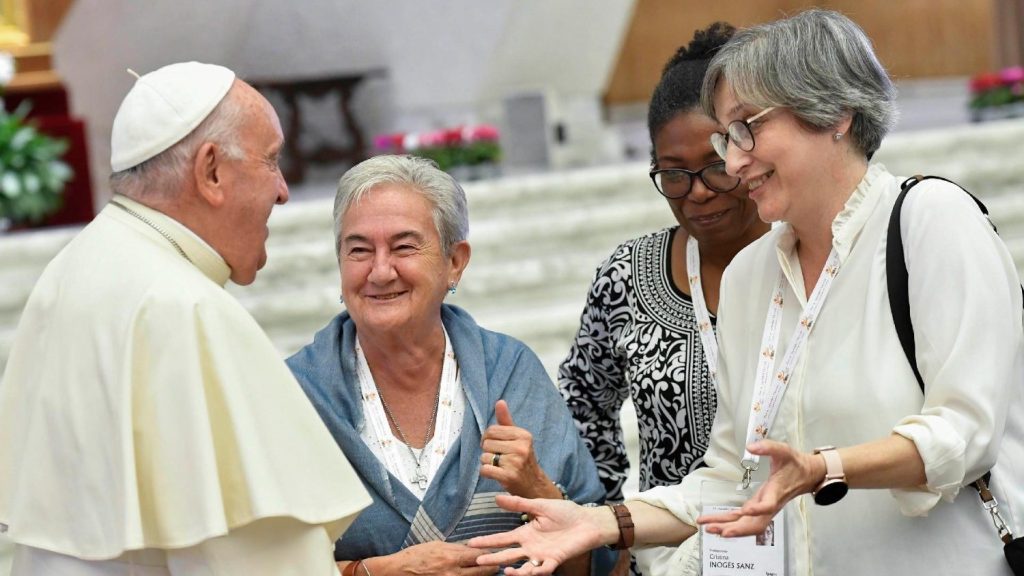
Martina Bär is professor of fundamental theology at the University of Graz (Austria).
Pope Francis, who passed away on 21 April 2025, made notable strides in addressing women and discrimination within the Catholic Church, though his efforts were often characterized by a balance between progressive appointments and adherence to traditional doctrine.
His attitude is seen by some as ambivalent: many women’s and gender organizations, for example, would have preferred that he promote women and non-binary people more from a dogmatic and canonical point of view.
On the positive side, however, it can be said that Pope Francis made some historic appointments that advanced women’s roles in the Catholic Church. He appointed several women to senior Vatican positions—for example, Sister Raffaella Petrini as governor of Vatican City and Sister Simona Brambilla as head of a major Vatican department. Other notable appointments were Barbara Jatta as director of the Vatican Museums, Sister Nathalie Becquart as co-undersecretary of the Synod of Bishops, and Sister Alessandra Smerilli as a senior development official. Regarding Church ministries, in 2021 he amended canon law to allow women to be formally instituted as lectors and acolytes, roles previously reserved for men. For the first time, women were granted the right to vote in synod meetings, marking a significant shift in their participation in Church governance.

In public statements, Francis consistently called for the elimination of laws discriminating against women and emphasized the importance of equal opportunities, including equal pay. He decried violence and abuse against women, urging society to respect their dignity and rights. He advocated particularly for girls and women in forced prostitution. Francis condemned this modern form of slavery in the strongest terms and advocated for the “Nordic model,” which criminalizes buying sex but not selling it, with the aim to reduce demand and protect those in prostitution.
Pope Francis approved the blessing of same-sex couples under certain conditions on December 2023. This was announced through the Vatican declaration Fiducia supplicans, issued by the Dicastery for the Doctrine of the Faith and authorized by the Pope. The declaration allows Catholic priests to bless same-sex couples but under clearly defined conditions. This approach aims to reach out to marginalized groups, including the LGBTQI+ community, fostering a more welcoming Church environment. Even so, Pope Francis repeatedly caused consternation with statements characterizing homosexuality as a disease.
Pope Francis’s fight against discrimination of women and LGBTQI+ people also exhibited limits. Despite forming commissions to study the possibility of female deacons, Francis maintained the Church’s stance against the ordination of women as priests, citing doctrinal reasons. Thus, he could hardly be called a feminist who would fight for wider changes in Church.
Francis was also very reserved when it came to gender issues, criticizing both gender studies and trans people. In the 2024 declaration Dignitas Infinita, the Vatican, under his approval, condemned “gender theory” and gender-affirming surgeries, characterizing them as threats to human dignity. At a conference in the Vatican that same year on the subject of the “Man-Woman Image of God,” Francis emphasized his negative opinion of gender theories and called gender research an ideology: “[I]t is very important for there to be this encounter, this encounter between men and women, because today the worst danger is gender ideology, which cancels out differences,” the Pope warned.
Francis stated further that he had asked for studies on “this ugly ideology of our time, which erases differences and makes everything the same; to erase difference is to erase humanity.” As many commentators note, this condemnation of gender theories as an ugly modern-day ideological danger is a harsh judgment and contradicts human scientific and medical findings on gender identities. The document Dignitas Infinita does accept the gender reassignment of intersex people but presumably only because it serves to standardize the two-gender gender order of Vatican teachings.
This two-gender order of creation was also cemented in the final document of the World Synod (2024). Admittedly, it no longer speaks of the complementarity of the sexes, as in previous magisterial texts, but rather of their reciprocity, which implies an ethic of mutual recognition on an equal footing. Nevertheless, the text continues to replicate gender difference, which is legitimized in terms of creation theology and God’s plan for humanity and theologically reinforces socially constructed gender stereotypes. This can be psychologically damaging for those individuals who do not fit into this scheme or do not wish to be reduced to it, especially in how they shape identity, behavior, and social expectations. The consequence of this premise and argumentation is that different vocations for men and women in the Catholic Church continue to be justified in this way: Only men can be admitted to ordained ministry—which means that women and non-binary people continue to be structurally disadvantaged and their vocations are taken less seriously.

Pope Francis’s efforts reflect an ambivalent legacy: he broke new ground in promoting women’s roles within the Church’s existing structures but stopped short of challenging long-standing doctrines on ordination. With regard to the end of discrimination against LGBTQI+ people in Church and society, it must be said that he never broke out of the two-gender mindset and remained attached to essentialist gender stereotypes—according to which women are particularly humane, caring people—at least publicly and doctrinally. This position frustrated many in the Catholic Church who had placed a great deal of hope in his willingness to more radically reform the Church.
